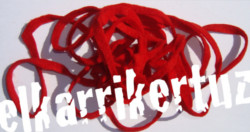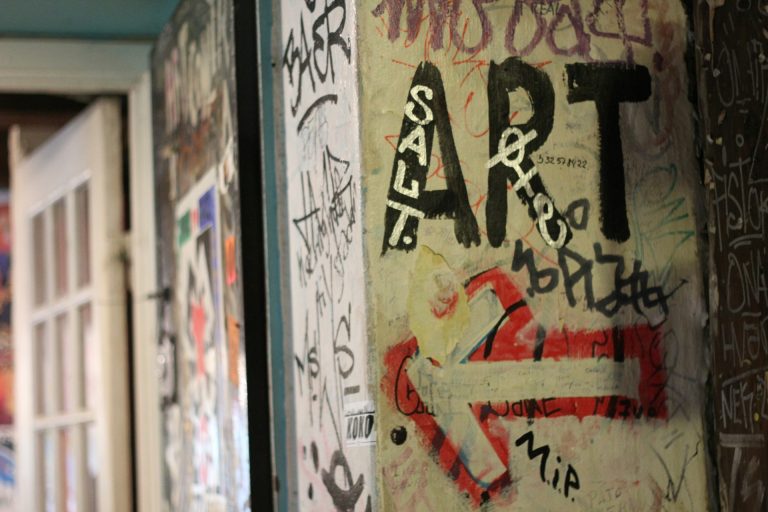In the last years, the members of the research groups Esbrina and Elkarrikertuz, have developed several research projects that have placed especial emphasis in the contextual and experiential dimensions of learning. These projects made evident that personal and professional knowledge cannot be separated from the biographic, cultural, social, technological, and affective experiences of the learners. In this respect, learning is embodied in an ecological process. This environmental notion of learning led us to develop the research project: “How do Teachers Learn: Educational Implications and Challenges for Addressing Social Change – APREN-DO” (EDU2015-70912-C2-1-R).
In this project we invited teachers from infant, primary and secondary schools in Catalonia and Basque Country to get involved in workshops to generate visual cartographies of those scenarios, inside and outside school, where they learn. We also asked them to participate in conversations to think about what they value as source of knowledge and experience, to generate forms of understandings of their nomadic learning displacements, their tensions and personal and professional learning expectations.
Cartographies have been ‘useful’ for our research because were taken as a strategy to generate ‘knowledge’ and relate to the theory (concepts such as ‘becoming’, ‘nomadic learning’ ‘gestures’, ‘rhizomatic relations’, and so on).
At the end of this project, we would like to invite colleagues to reflect and share issues and questions emerging from this nomadic process of inquiry:
- How can we access ‘places’ beyond the pre- established frameworks for research on teachers’ learning?
- How to think on teachers’ learning beyond objectivity, modern onto-epistemologies, and representational logic in research?
- Which are the contributions of inventive methods to expanding and questioning the narrative of teachers’ biographical-learning trajectories?
- In which ways the cartographic process affects teachers’ learning gazes and researchers’ positionalities?
- How a nomadic approach could introduce disruptive ways of thinking about what research on teachers’ learning could be?
- How notions such as “becoming, displacement, strength, assemblage, entanglement, affects, gestures…” could expand the ways of narrating and help to raise new questions about teachers’ learning -and the very notion of ‘learning’ itself?
- Which are the potentialities of strategies coming from this nomadic approach of learning and researching to rethink teacher professional development?
Program
Thursday October 25th 2018
9.30h
Reception opening
10.00h
Welcome and introduction to the Symposium
Juana M. Sancho Gil
Esbrina research group coordinator
Estibaliz Jiménez de Aberasturi Apraiz
Esbrina research group coordinator
Carles Guerra Rojas
Director of Tàpies Fundation
10.30h
The multi-dimensional mapping of transindividual sympathy
Keynote and conversation
Elizabeth de Freitas
Manchester Metropolitan University
12.00h
Coffee break
12.30h
Communications
The attendees are distributed in discussion tables in the room.
Group 1: Cartographies related to education and training.
Chair: Aurelio Castro Varela (Universitat de Barcelona)
- Cartografías de artista. Ana María Marqués Ibáñez. Universidad de La Laguna.
- Arte, espacio y formación docente. Una propuesta interdisciplinaria autoformativa. Andrés Torres Carceller, Júlia Castell Villanueva, Anna Mauri Lujan, Eva Navarro Campanera y Cristina Otero Fernández. Universidad de Barcelona.
- The use of cartographies in focus groups for finding guidelines in teacher education on world citizenship. Palma Grano. University of Barcelona.
Group 2a: Teacher trajectories cartographies
Chair: Cristina Alonso Cano (Universitat de Barcelona)
- Cartografías de una profesora Flâneuse en París. Amparo Alonso. Universitat de València.
- Diálogos con nuestras cartografías de aprendizaje. Juana M. Sancho Gil (Universitat de Barcelona), Begoña Ochoa-Aizpurua Aguirre (Universidad del País Vasco), José Miguel Correa Gorospe (Universidad del País Vasco) y Maria Domingo-Coscollola (Universitat Internacional de Catalunya).
- Alrededores: estética e imaginación como ejercicio político en la formación de profesores de arte. Rita Luciana Berti Bredariolli Instituto de Artes da Universidade Estadual Paulista “Julio de Mesquita Filho”, IA-UNESP.
Group 2b: Teacher trajectories cartographies
Chair: Juliane Correa (Universidade Federal de Minas Gerais)
- La serendipia cartográfica: de la investigación a la formación. Vanesa Gallego-Lema, Begoña Ochoa-Aizpurúa Aguirre y Margari León Guereño. Universidad del País Vasco.
- Exploración cartográfica de afinidades y afectos en la investigación. Sara Carrasco Segovia. Universidad de Barcelona. Jennifer Wicks. Universidad de Concordia, Universidad de Granada.
- Desplazamientos en un proyecto sobre cómo aprende el profesorado. Jose Miguel Correa Gorospe, Estibaliz Aberasturi Apraiz, Asun Martinez-Arbelaiz (University Studies Abroad Consortium USAC),Aingeru Gutierrez-Cabello (Universidad del País Vasco/ Euskal Herriko Unibertsitatea UPV/EHU).
- La influencia de los referentes biográficos para el aprendizaje del profesorado que participa de los mooc: el relato de un caso. Ada Freitas Cortina y Joaquín Paredes Labra. Universidad Autónoma de Madrid (UAM).
Group 3a. Teachers’ trajectories and experiences
Chair: Raquel Miño Puigcercós (Universitat de Barcelona)
- Aprendizajes docentes en movimiento: algunas reflexiones a partir de la experiencia en el ómnibus blanco. Gabriela Meroni Toledo, Nicolás Achard Arlington, Matías Gutiérrez Guillermo, Lucía Pastore Favotto. Instituto Crandon (Uruguay) y Joaquín Paredes-Labra. Universidad Autónoma de Madrid (España).
- El cuerpo brincante, los juegos de tablero y el portfolio a servicio de las múltiples aprendizajes. Márcia Ambrósio y Eduardo Mognon Ferreira. Universidade Federal de Ouro Preto (Brasil).
- El aprendizaje que no termina. Estudio de caso de lo que funciona y lo que puede mejorar en la formación continua de los y las docentes de Educación Infantil de Córdoba. Ana García Gutiérrez y Miguel Muñoz Moya.Universidad de Córdoba.
13.30h
Break
15.00h
Why does teacher learning matter? Critical Issues and Possibilities
Keynote and conversation
Maria Assunção Flores
University of Minho
16.30h
Coffee break
17.00h
Communications
The attendees are distributed in discussion tables in the room.
Group 3b. Teachers’ trajectories and experiences
Chair: Aingeru Gutierrez-Cabello (Universidad del País Vasco/ Euskal Herriko Unibertsitatea UPV/EHU)
- Las metáforas docentes. Yareni Annalie Domínguez Delgado. Universidad Nacional Autónoma de México.
- Roles difusos. Reflexiones alrededor de una experiencia de asesoramiento a docentes seniors siendo noveles. Gabriel Hervas Nicolas e Isaac Calduch Pérez. Universitat de Barcelona.
- Vivir, querer, aprender… para dejar crecer: Trayectorias biográficas en identidad(es) docente(s). Núria Simó-Gil, Marta y Lídia Sala-Font. Universitat de Vic-UCC.
- Uso de las tecnologías de información y comunicación en la formación de educadores del campo. Juliane Corrêa, Universidade Federal de Minas Gerais (Brasil), y Leonardo Zenha Cordeiro, Universidade Federal do Pará (Brasil).
- Can we conceptualize learning as a journey? Thinking of time and space. Asunción Martínez Arbelaiz, University Studies Abroad Consortium, José Miguel Correa Gorospe, Estibaliz Aberasturi Apraiz Universidad del País Vasco-Euskal Herriko Unibertsitatea.
- Relatos de formación y saberes docentes. Historias de vida de profesores principiantes en Chile y España. Patricia Hermosilla – Universidad de Chile. Amalia Creus – Universitat Oberta de Catalunya.
- Cartografías y narrativas docentes: la dimensión tensional como posibilidad (de aprendizaje). Luispe Gutiérrez Cuenca. Universidad del País Vasco (UPV-EHU).
Group 4a. Learning in teaching students at university
Chair: Pablo José Rivera Vargas (Universitat de Barcelona)
- Aprendiendo sobre educación inclusiva desde la investigación en formación inicial de profesorado. Begoña Vigo Arrazola. Universidad de Zaragoza.
- Aprender a ser docente: impacto emocional al participar en un prácticum innovador. Rosario Mérida Serrano y Julia Rodríguez Carrillo. Universidad de Córdoba.
- Creación musical compartida: un espacio de aprendizaje cooperativo entre docentes. Almudena Ocaña Fernández y Mª Luisa- Reyes López. Universidad de Granada.
- Marcas significativas en los estudiantes que transitan la formación universitaria: enfrentarse a las nuevas trayectorias escolares que expresan los problemas y las posibilidades de los tiempos contemporáneos. Estela D’Angelo Menéndez, Laura Benítez Sastre, Lara Rodríguez García y Sandra Pérez Martín. Universidad Complutense de Madrid.
Group 4b. Learning in teaching students at university
Chair: Maria Domingo Coscollola (Universitat Internacional de Catalunya)
- La estética relacional como ejercicio de aprendizaje. Un “estar juntos” desde el antagonismo y el cuidado. Olaia Miranda Berasategi y Alaitz Sasiain Camarero-Nuñez. Facultad de Educación, Filosofía y Antropología, EHU-UPV.
- La experiencia biográfica como dispositivo formativo en la asignatura de trabajo final de grado. Lilian Ucker Perotto. Universidad Federal de Goiás (Brasil).
- Entrelazando aprendizajes. Maestras y estudiantes aprenden juntas en una experiencia de prácticum innovador. María de los Ángeles Olivares García y María Elena González Alfaya. Universidad de Córdoba.
- Formació del professorat i competències clau: un binomi necessari per l’educació del futur. Salvador Oriola, Alba Montoya i Adrien Faure. Universitat de Barcelona.
18.00h
End of the day
Friday October 26th 2018
10.00h
Ecologies of practice, speculative gestures and disobedient pedagogies
Keynote and conversation
Dennis Atkinson
Goldsmith College. University of London
11.30h
Coffee break
12.00h
Researching as researchers’ affection process
Keynote and conversation
José Miguel Correa Gorospe
Elkarrikertuz research group. University of the Basque Country
13.30h
Break
15.00h
Teachers’ cartographies as territories to think about learning and affects
Keynote and conversation
Fernando Hernández-Hernández
Esbrina Research Group. University of Barcelona
16.30h
Coffee break
17.00h
Communications
The attendees are distributed in discussion tables in the room.
Group 5. Multimodalities in learning processes
Chair: Asun Martinez-Arbelaiz (University Studies Abroad Consortium USAC).
- El lifebook como instrumento de reflexión sobre experiencias de aprendizaje de dentro y fuera de la escuela. Iris Merino Rubio, Judith Oller Badenas, Jaime Fauré Niñoles y Antonio Membrive Ruiz. Universitat de Barcelona.
- Juegos de mesa: revelando procesos históricos y creativos de enseñar, aprender y evaluar. Márcia Ambrósio y Eduardo Mognon Ferreira. Universidade Federal de Ouro Preto (Brasil).
- Música, género y docencia: de la segunda mitad del siglo XIX a nuestros días. Sandra Soler Campos. Universitat de Barcelona.
- La coreografía de Anna. Ariadna Saiz Mingo. Universidad de Burgos.
Group 6. Cartographies, corporeities and biographical movements
Chair: Judit Vidiella Pagès (ERAM, Universitat de Girona)
- Cartografías artísticas del cuerpo. Ana María Marqués Ibáñez. Universidad de La Laguna.
- Cuestionándolo, cuestionándome. Laia Becerra Martínez. Profesora de Educación Secundaria y Enseñanzas de Régimen Especial de Artes Plásticas y Diseño del Gobierno Vasco.
- Flotar como forma de desplazamiento bajo una perspectiva post-cualitativa. Miriam Corredera Cabeza. Universidad de Barcelona.
- Mapping Wills: co-creating life timelines and inventing narratives. David Limaverde.
- Paisajes subjetivos en la fábrica: ficciografías de los cuerpos que se fabrican. Leidy Yaneth Vásquez Ramírez y Teresita Ospina Álvarez. Universidad de San Buenaventura- Medellín.
18.00h
What the new ontology brings to rethinking research and education
Roundtable
Chair
Fernando Hernández
Juana M. Sancho
Esbrina Research Group. University of Barcelona
Elizabeth de Freitas
Manchester Metropolitan University
Dennis Atkinson
Goldsmith College. University of London
19.00h
Final remarks
Asun Martinez i Aingeru Gutierrez-Cabello
Elkarrikertuz research group. University of the Basque Country
Joan-Anton Sánchez Valero i Maria Domingo Coscollola
Esbrina Research Group. University of Barcelona
19.30h
End of the symposium
Papers
We invite all those interested in these issues to submit conceptual, practical and research papers around the previous questions attending the following considerations:
Language: Catalan, Spanish, or English.
File format: Microsoft Word.
Extension: minimum 700 words, maximum 1,400 (references included).
As a rule, especially for references, follow APA2016 standards.
Date: before July 15th 2018. Send your file to esbrina@ub.edu
Response on the accepted papers: July 25th 2018.
All papers will be accessible at the conference web page.
Date
October 25th and 26th 2018
Registration
Venue
Fundació Antoni Tàpies
C/ d’Aragó, 255, 08007 Barcelona
Organized by

Scientific committee
José Ignacio Rivas Flores
Universidad de Málaga
Adriana Gewerc Barujel
Universidad de Santiago de Compostela
Juan Bautista Rodríguez
Universidad de Granada
Jose Paiva
Universidad de Oporto
Christoph Meader
University of Teacher Education Zürich
Juliane Correa
Universidad Federal de Minas Gerais
Audra Skukauskaite
Klaipeda University, Lithuania
Apolline Torregrosa
Universidad de Ginebra
Daniel de Queiroz Lopes
Universidade Federal de Porto Alegre
Joaquin Paredes
Universidad Autónoma de Madrid
Carmen Alba
Universidad Complutense de Madrid






